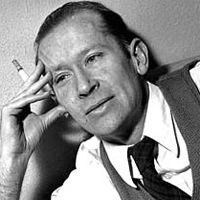O Sweet Spontaneous by Edward Estlin Cummings: Summary and Analysis
O Sweet Spontaneous by Cummings is about the significance of earth in the modern and unique style in poetry writing. The speaker identifies the earth sweet and spontaneous. He asks the question that how often the doting fingers of lusty philosophers have pinched and poked the earth. Similarly, he wants to know where the naughty thumb of science has pinched the earth or not. He asks how often the religions have squeezed the earth in a mighty way. But the earth is the lover of rhythm. She is true to the incomparable couch of death and answers all them with only with spring.

E. E. Cummings (1894-1962)
In this poem, the poet speaks of his love and caring for mother earth. He also displays his disdain of humanity. Human kind is responsible for the destruction of nature and its beauty. The philosophers, the scientists, and the religious people all are equally performing notorious acts to pollute the earth. Humankind doesn't let the earth to be eternal and absolute. The philosophers are unnecessarily pinching and poking the sweet earth. The scientists have used this earth as the lab for their various experiments. Even religion doesn't find any worth in the eternity and spontaneity of the earth. These three issues are only a few examples, but the earth is attacked from everywhere and by everyone. All they have dark and ill-intention behind misusing the earth. The poet, in a very bold manner, states that the spring is the only answer to them who are trying to compare the earth to the couch of death. It is foolishness to desire the ultimate loss of the earth. For the poet, the earth is already perfect, spontaneous, and harmonious without any human attempt to construct it. The poet is satirical to them who call themselves the lover of the earth. It means that the earth can't tolerate any intervention and crime upon it.
Using poetic devices like alliteration, assonance, and modifiers, Cummings draws the reader a dark picture of humanity as he presents his unique view of earth. The effect of numerous devices demonstrates his linguistic capability, creating precision, invention, and deliberation. "O sweet spontaneous" offers two specific graphological features, the constant use of non-capital letters and old English words. The poem begins with alliteration and continues its use throughout and he uses assonances in employing phonetic parallelism. This poem furthermore gives prominence to enjamed lines that make readers go into deep thinking. The title of the poem has been repeated in the very first line. Alliteration is there in sweet and spontaneous. The poem begins with a capital letter 'O' that is the only capital letter throughout the poem. The sense of surprise /amazement can be felt when the poet says- "O sweet spontaneous. He heavily depends on pause so that the readers get a chance to think over it. Alliteration is found in /prurient/, /philosophers/and /pinched/. The poet has used the verbs like, pinched, poked, prodded, squeezing, and buffeting to describe the mistreatment of philosophers, religions and science to the earth. All these verbs provide negative meanings in their connotation.
The first part of this poem is in the form of rhetorical questions. The poet asks three questions to the earth, but the earth remains silent. In asking such rhetorical questions, question marks have been neglected. Throughout the poem, earth has been personified and humanized. In the second section, the poet himself offers answers to his previous question. The second part of the poem is separated from the first part as it is put in the bracket.
As a modern poet, Cummings, enjoys violating standard language and its grammatical system. The poem has only one capital letter, one comma, and one period. The poem has interesting line breaks. He has deliberately avoided capitalization, punctuation marks, and word order. His poems are pictorial. The poem is printed in a different manner, experimenting with poetic stanza. He provides common ideas in new styles through deviation. The poet has personified religion and science. He says that science "has naughty thumb" and religions have "scraggy knees". He attributes human body parts while mentioning about science and religion. This is the technique of personification.
Related Topics
Buffalo Bill's: Summary and Analysis
For Prodigal Read Generous: Summary and Analysis
i sing of Olaf glad and big: Summary and Analysis
my father moved through dooms of love: Analysis
anyone lived in a pretty howtown: Analysis
in Just-spring: Summary and Analysis
since feeling is first: Summary and Analysis
 |
bachelorandmaster.com |